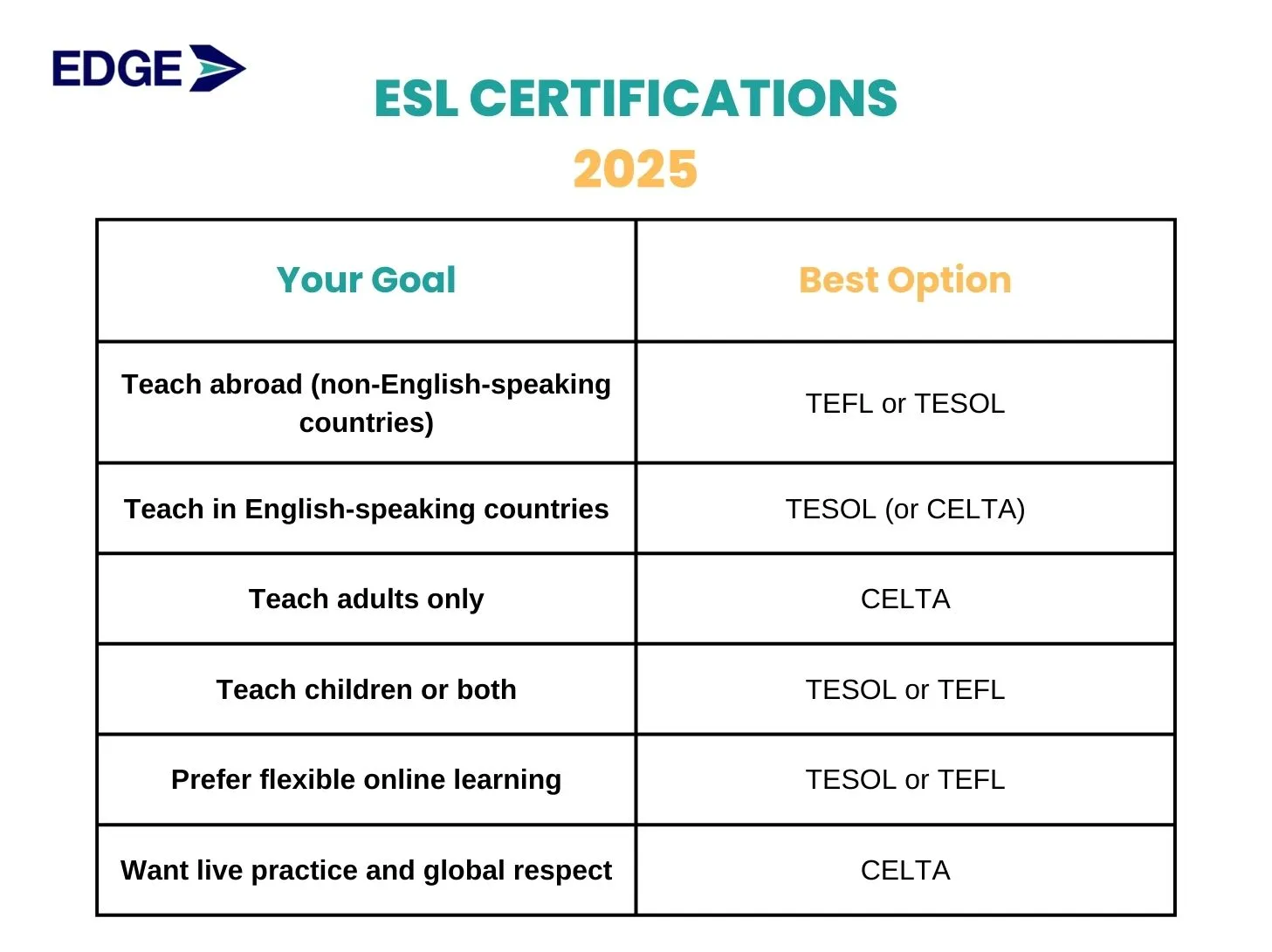%20(2).webp)
Starting a career in teaching English is an exciting step, but choosing the right certification can feel a little confusing at first. With options like TESOL, TEFL, and CELTA, it’s easy to get overwhelmed, especially when they all seem so similar.
At EDGE Tutor, we understand how important it is to find the certification that matches your goals, whether you plan to teach online, abroad, or in a classroom. That’s why we created this simple, easy-to-follow guide to help you understand the key differences between these three popular ESL certifications.
This article will walk you through what TESOL, TEFL, and CELTA are all about, how they compare, and which one might be the best fit for you. No complicated terms, just clear, helpful info to get you started on your teaching journey with confidence.
When it comes to TESOL vs TEFL, the difference isn’t as big as many people think. In fact, they’re often used interchangeably. Both are certifications that prepare you to teach English to non-native speakers. Both are also widely accepted by schools and online teaching platforms around the world.
The main distinction lies in where you plan to teach. TEFL (Teaching English as a Foreign Language) is typically geared toward teaching English in countries where English is not the native language, like Thailand, Japan, or Germany, and many others. It’s perfect for those who want to travel and work abroad in non-English-speaking regions.
On the other hand, TESOL (Teaching English to Speakers of Other Languages) covers a broader range. TESOL is used not just abroad, but also in English-speaking countries such as the U.S., Canada, or Australia. It’s often the preferred certificate if you plan to teach immigrants or non-native speakers who are living in English-speaking areas.
That said, many language schools and online tutoring companies treat TESOL and TEFL as equivalent. For most jobs, the difference in name doesn’t matter as much as the quality, accreditation, and content of the course you take.
CELTA (Certificate in English Language Teaching to Adults) is technically a type of TESOL course. However, it’s much more structured, intensive, and recognized globally, especially because it’s issued by Cambridge University. Hence, it carries weight in the education world.
CELTA courses are typically in-person or blended. It requires at least 120 hours of study, and includes more than 6 hours of observed teaching practice with real students. This hands-on approach makes CELTA one of the most respected ESL certifications out there. This is especially useful for those who want to teach adults in formal classroom settings or apply for higher-paying ESL jobs.
On the other hand, TESOL courses can vary a lot in format, length, and cost. Some are offered completely online, others include optional live teaching practice. They often come with more flexibility in terms of scheduling and focus areas. You’ll also find TESOL courses designed specifically for teaching children, business professionals, or general English learners. This is something CELTA doesn’t usually offer.
If you’re looking for an intensive training program and want to focus on teaching adults, CELTA is an excellent choice. But if you need a more flexible, affordable, and beginner-friendly certification, a TESOL course might be a better fit, especially if you plan to teach online or start teaching kids.
Here’s a simple ESL certification comparison based on your situation:

To recap the key differences:
All three are great certifications; it just depends on your goals, your budget, and your preferred style of learning.
So, which one should you choose? Think about:
Getting certified is an important first step toward becoming a confident and qualified English teacher. Each option has its strengths, so pick the one that fits your goals, budget, and teaching plans.
At EDGE Tutor, we value teachers who are well-prepared and passionate. An ESL certificate not only builds your skills but also helps you stand out when applying for teaching roles, especially in online platforms like ours.
With the right certification, you’ll be ready to teach and make an impact wherever you go.